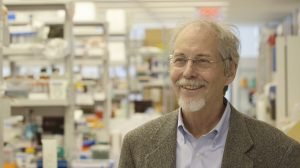
Session Description:
Even though we can now “read” the human genome, we’re far from understanding it. Two leaders of “Genome Project–write” (which aims to move towards building organisms by starting with their genetic code) update us on scientific and technical advances and the ethical and moral quandaries as we move from decoding the genome to writing and enhancing it.
Below is an excerpt of the Writing our Genome session. The full transcript can be found here.
David Duncan: I’m David Ewing Duncan, and I’m very pleased to be moderating this panel. I love it, as a journalist, I often have stories, I hear about things way in advance of other people and they’re brand new technologies. It’s almost sci-if, it seems and I take them to my editors and they go, “We don’t get this,” and they have no interest in doing a story. And then suddenly, everybody wants to do a story. So we’re not quite there yet with this but I think we’re getting pretty close. You all are feeling that happening here.
So we just heard about the meeting last week, and I guess it attracted—it was several hundred people, right?
Nancy Kelley: More than 220 people.
Duncan: Yes, so a lot of people, from all over the world. So we just heard a little bit about it, and I wanted to just quickly, because I want Bob to respond—he’s our physician ethicist. He’s one of these guys who has multiple titles, amazing. I don’t know how you guys do all that, but anyway. For those of us who are not scientists, maybe you could give a quick explanation of what exactly you’re doing, you know, maybe to a sixth grader or something like that.
[LAUGHTER]
You know, how does this actually work?
Robert Klitzman: Okay, well I think the analogy of reading and writing is relatively straightforward. It’s a pretty boring language they’re writing. It only has four letters: G, A, T, and C. And it’s really the order of those letters and the way they’re strung together that forms the genes and the chromosomes that are the blueprint of our organism and all organisms on the planet. And an interesting point about reading versus writing DNA has an analogy in reading and writing a book. When you read a book, it’s kind of a straightforward passive exercise. You read it and then you know when you’re finished. Writing a book, however, has a very different feel to it. It is fundamentally a creative exercise. You have to decide what to write. There are an infinite number of books one could write, and similarly, there are an infinite number of genomes one could write. And so it really all boils down to something I heard Esther Dyson say earlier today, which is it’s not the technology, it’s what do you want to do with it. How are you going to use it? And that’s the hard part is finding that sweet spot between what’s doable and what’s worthy of doing, what would make a difference in our world.
Duncan: Just really quickly, how close are we to this?
Klitzman: To what?
Duncan: To having what you guys want to achieve, your vision.
Klitzman: The yeast is a microorganism, but it’s a higher organism so it’s more closely related to us, and we’re very far along on that. I’d say we’re about 80% complete. We recently published on—a total of six and a half of the 16 chromosomes are completely signed, sealed, and delivered, analyzed and so on, and the other nine and a half are well on their way, with an international team all over the world. So there’s no question that this can be done. The question now is what other projects are really worthy of doing as we advance this to a larger scale. And in the meantime, we need to reduce the cost dramatically because the costs are just way too high to contemplate right now for
something like the human genome. It costs about ten cents a base and it’s three billion bases or DNA letters. So that’s far too expensive, obviously, so we want to reduce that cost by a factor of a thousand so that we can contemplate this kind of work on the much larger scale.
Duncan: And I think you said we’re about five years out—and I know you have something that you want to say, Nancy. But if you could do it right now, and the costs and all these other factors, you’ve said it’s about five years out, or it could be. So what I’m trying to get at here is this could happen fairly quickly, potentially.
Kelley: I think what Jef is talking about is work in the human genome would be five years out, although there’d be implications on a smaller level earlier while the ethical implications of that project would be being discussed. But we’re ready to start in pilot projects now. For example, Harris Wang at Columbia just received a $500,000 dollar grant to study a phototropic human cell line. And so the work is beginning now and we will be seeking additional funding for that.
But what I wanted to say is another analogy that may be more familiar to people is in the
digital world, right? So just as the computer code software that we work with consists of infinite permutations of zeroes and ones that are used to drive everything all over the world, and started with enormous computers that were very expensive and now come down to mobile units that are relatively very low cost, it’s the same four building blocks that Jef is talking about, four letters that scientists are using on the computer to design new segments of DNA and to try to understand how they are going to operate in cell lines. So we’re at a very similar place right now and I think you’re going to see the trajectory of progress be just as intense.
Duncan: Yeah. And I was just trying to set you up, Bob, so we could figure out where we
were. And I would love to have you respond any way you like with your various hats, I mean, as a physician, somebody that works that patients, as an ethicist. How do you respond to this project?
Klitzman: I think this is a great project and I think what you’ve heard here and in the previous panel is that we’re in a very exciting period of time in terms of understanding the human genome. Really it was less than 20 years ago that we first did a draft sequence of the human genome and we’ve learned a lot. There are a lot of benefits, but there are also a lot of risks, and I think like any new novel technology—think understanding the human atom—we can produce cheap nuclear energy or we can produce atomic bombs. And so I think in answer partly to what David was saying earlier, technology is revolutionizing healthcare. It has been for hundreds of years. It’s going at a quicker pace and we need to be careful. And I would say also, we need to think about, getting back to what David was saying earlier, why we in the U.S. pay so much for healthcare and have the worst healthcare among industrialized countries. And a key thing is following the money in a lot of issues, and this included, I’d say.
And I also just want to comment briefly on some of the issues that were relayed in the previous panel. It’s estimated that precision medicine will probably help with diagnoses for about 3-5% of people. So 95% of you here will not have useful, actionable diagnoses through precision medicine, at least in your lifetimes most likely. We’ve done research, giving back, doing whole genome sequencing, finding out how many people have actionable results. It’s a small number, it’s a great number. The cases we heard earlier of the kid with cancer, that’s great, but for diagnoses it’s limited, just to put that in context.





